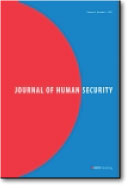Re-Examining Security Dynamics: Proliferating New Threats as Catalysts for Interstate Cooperation in Europe

Autor(en): Jonas Hagmann
Journaltitel: Journal of Human Security
Reviewed:
Band: 4
Ausgabe: 1
Seiten: 18-36
Verlag(e): RMIT University Press
Publikationsjahr: 2008
